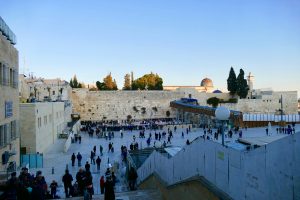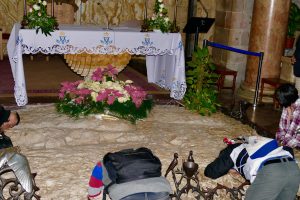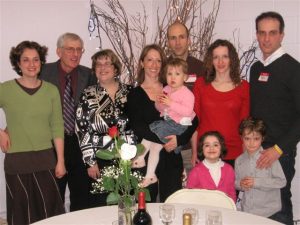The End of The World: Last Things
Resource: Who Knows the Shape of God? by Corbin Eddy.
(Daniel 12:1-3; Ps 16; Hebrews 10:11-14, 18; Mk 13:24-32)
************************************************************
Are you in a rut, or in a groove? Some people are in a rut so long they think it’s a groove.
Today’s readings are designed to jar us out of any rut we may be in, by changing our life establishing priorities and being open to a whole new reality.
In the gospel, Jesus is seated on the Mount of Olives, looking over the splendour of the Temple – the meeting place of faith, culture and history for his people. Most people would see the scene as a tourist sees it. Jesus, however, knew that this great Temple was vulnerable. Like all civilizations and cultures, fatal flaws can develop from within. It is also true that hostile forces can attack from without. Jesus saw both forces were at work with regard to this great Temple. The Temple leadership was corrupt and flawed, and the power of Rome very present. For all its magnificence, the Temple was on shaky ground, as well as the religious and cultural structures it represented. The world of the Temple was coming to an end.

Western “Wailing” Wall – Jerusalem
Jesus invites his hearers to take the long view – beyond the temple, the city, even the heavens and the earth. He speaks of an end time, a final judgment, a new reality after some suffering. He invites us to go beyond civilizations, beyond the worlds we know and try to control, beyond the physical magnificence we see. We are to get out of our rut, and see the future with the eyes of Jesus.
The significance of this passage from Mark cannot be overstated. Located just prior to the passion narrative, it heralds what is to come. From that same Mount of Olives, Jesus himself would soon suffer his agony of discernment, and embrace the end of his own world. That same view would be before him on the night before he was betrayed and died. His admonition to “watch and pray” is in a sense his last will and testament to us. His watching and praying would lead him to the cross that for all its pain will be his ultimate triumph.

Church of the Agony, Mt of Olives
Here, and later in this same garden during his agony, Jesus invites us to join him in genuine discernment in our own lives, of what matters and what does not, of what will last and what will not, of the inevitable end of many worlds.
We all have some sense of this by just watching world events: the sudden death of friends; the bankruptcy of Enron; the horror of September 11th, the California wildfires – worlds in which people live can pass away suddenly in so many ways.
It is easy for us to get stuck in a rut, a rut we think is a groove, but which distracts us from the real purpose of our lives. A biologist once described on television an experiment he called “processional caterpillars.” He had lined them up on the rim of a pot holding a tasty plant so the lead caterpillar was head-to-tail with the last caterpillar, leaving no break in the parade. The tiny creatures walked around the rim of the pot for a full week before all of them died from exhaustion and starvation. Not once did any of the caterpillars break out of the line and venture over to eat the plant. Food was only inches away, but the follow-the-leader instinct was even stronger than the drive to eat and survive.
An article covering the resignation of Bill Galston as a domestic policy advisor to President Clinton ran in the Baltimore Sun some years ago. He announced plans to return to his teaching career at the University of Maryland – “to strike a new balance” in his life. He had been living a very productive live, but had to make changes to his own “big picture.” He had had a hand in the formation of the National Campaign Against Teen Pregnancy, and was working on education reform and promoting new legislation to strengthen Head Startprograms. He tried hard to make time for his own son, Ezra, and even brought him to his White House office in the evening. Still, he was hounded by the fact that, more often than not, he came home too tired to really enjoy being there. There was a contradiction between his Putting Children Firsttheme and policy initiatives, and his own relationship with his son. What finally brought his world to an end was a note from his son: “Baseball’s not fun when there’s no one there to applaud you.”
Some years ago, my brother Louis underwent an operation to remove an aggressive, cancerous brain tumour. Months of chemo and radiation treatment followed, and he lived on borrowed time for four years, having defied the odds. To say the least, the world he knew came to an end. He had lost the ability to read and to drive. Yet he and his wife Judy counted their blessings – they became closer to their children, their grandchildren came to know and love each other more than they ever had before, and they came to see every day they had left together as a total blessing.

Louis, Judy and family
This theme of watchfulness, typical of Mark, includes us all. We live in God’s time, under God’s reign, and are invited to see and understand our lives accordingly – in communion with Jesus who has gone before us and goes before us all the time. In some sense, every person in every generation experiences the end of the world and the last things. The issues Jesus raises are truly perennial. His questions need to become our questions; his way of discernment needs to become our own. What will last and what won’t? What is worthwhile and what is not? These are timeless, ageless questions that call for real vigilance and prayer, struggle and sacrifice.
The Eucharist is a bridge between our present reality, and the awesome future reality God has in store for us that Jesus has already initiated.
How much we experience that new world already today depends on our willingness to change our lives, establish priorities and be open to a whole new reality.




Well thanks for sharing your story and experience being in a groove from being in a nut. The way you expressed is a clear understanding about being closer to God. When we open our selves up by opening our hearts and minds to receive the Lord and let him enter our lives. If we can let go of the past and willing to change ourselves from all the discernments and worthless things that has been troubling us over the years. Just like remembering a family member and a friend that passed away many years can bring us closer together. I felt that way when my aunt passed away from cancer years ago and I was closer to my cousin and her father than before. My aunt’s last wish is to enter the Catholic faith before she passed away. I already was closer to the family when my aunt was still alive on this earth. Basically, I am pretty much open and willing to change as a person by helping people who are sick, poor and people who are suffering in pain. We can also walk this whole new reality that God has in store for us. It is never end of the world if we believe and trust in God. It will be full of joy and happiness future that is waiting for us . Amen
Thanks for this heart warming and beautiful message about experiencing this new reality and leading us to eternal life. We will always be children’s of God and be his disciple living out his word. Thanks for sharing those pictures and your experiences. Bishop Sylvain Lavoie . Gracias!